Do you know what is emotional incest? It may sound like a strange term, but it refers to a type of relationship dynamic that can have profound effects on individuals involved.
How often have we heard someone say, “I am my mother’s confidante” or “My dad and I share everything”? While these statements may sound harmless, even commendable, they can sometimes point to a lesser-known and misunderstood psychological phenomenon – emotional incest or emotional incest syndrome.
Let’s explore this often overlooked aspect of human relationships and find out the signs of emotional incest, effects of emotional incest and if healing from emotional incest is possible.
What is Emotional Incest?
Emotional incest, also known as enmeshment or covert incest or psychic incest, is a term used to describe a relationship dynamic between a parent and child that becomes excessively enmeshed, crossing emotional boundaries and blurring the lines between parental and romantic roles.
So what is emotional incest? To put it succinctly, emotional incest occurs when a parent looks to their child for the emotional support that would typically be provided by another adult.
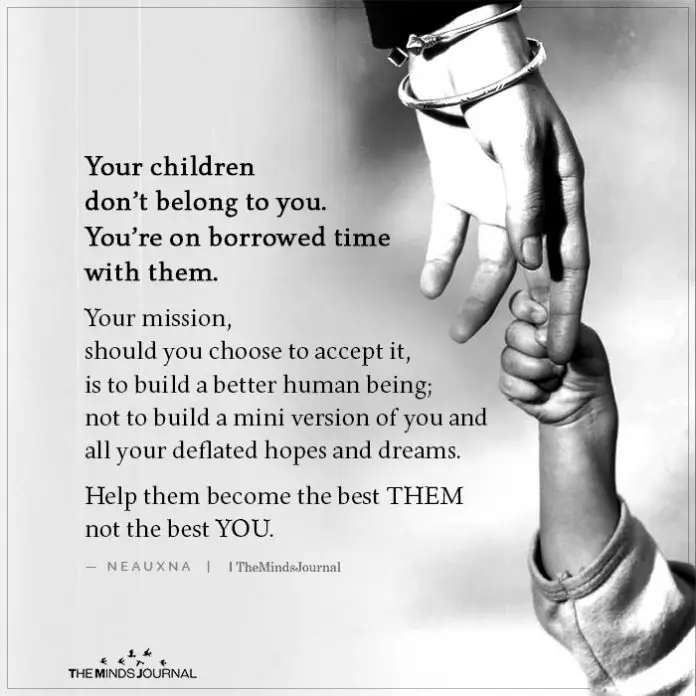
In emotional incest, a parent may rely on their child for emotional support, companionship, or validation that should be sought from adult peers or partners. This relationship might seem like close bonding, but it blurs the boundaries between parent and child in unhealthy ways.
Related: The Sons Of Narcissistic Mothers And The Damage They Endure
Unraveling Emotional Incest Syndrome
So, what is emotional incest syndrome?
Emotional incest syndrome is the term used to describe the long-term effects of emotional incest on an individual. It is not a recognized psychiatric diagnosis, but rather a concept coined by therapists to help explain the complex emotional and psychological impact of this type of relationship dynamic.
It refers to the set of symptoms or behavioral patterns a person might develop as a result of being in an emotionally incestuous relationship. This might include chronic anxiety, guilt, a sense of being “smothered,” and difficulties in forming healthy romantic relationships.
For example, someone who grew up being their parent’s primary confidante might feel responsible for other people’s emotions and needs. They might suppress their own desires and needs, feeling as if they’re secondary or even unimportant.
Signs of Emotional Incest
Emotional incest is a complex and often subtle phenomenon that can be challenging to identify. However, recognizing the signs is crucial for understanding and addressing this harmful dynamic.
Here are some common signs of emotional incest that will help us better understand what is emotional incest –
1. Excessive Emotional Reliance
One of the key signs of emotional incest is when a parent becomes overly dependent on their child for emotional support, companionship, or validation.
The parent may share intimate details of their life, fears, and problems with the child, treating them as a surrogate partner.
2. Blurred Boundaries
Emotional incest often involves blurred boundaries between the parent and child. There may be an absence of age-appropriate boundaries, such as –
- Invading the child’s privacy
- Expecting exclusive emotional access to their thoughts and feelings
- Relying on the child to fulfill the parent’s emotional needs
3. Emotional Enmeshment
Emotional enmeshment occurs when the parent and child become excessively entangled, with the child feeling responsible for the parent’s emotional well-being.
The child may feel a sense of obligation to meet the parent’s emotional needs, sacrificing their own autonomy and individuality.
4. Role Reversal
In emotionally incestuous relationships, the traditional parent-child roles may become reversed. The child may be expected to provide emotional guidance, support, or advice to the parent, taking on a role that is more appropriate for a peer or partner.
5. Compromised Identity
The child’s sense of self is entangled with the parent’s identity, needs, and emotions. They may struggle to differentiate their own desires and emotions from those of the parent.
6. Lack of Autonomy
Emotional incest can hinder a child’s ability to develop their autonomy and independence. The child may struggle to establish their own identity and make decisions without seeking approval or validation from the parent.
They may feel a constant need to please the parent at the expense of their own desires and needs.
7. Dependency
The parent is overly reliant on the child for emotional support, companionship, or decision-making, to the point that it interferes with the child’s own needs and development.
8. Emotional Manipulation
Emotional incest often involves emotional manipulation by the parent. They may use guilt, emotional coercion, or dependence on the child to maintain control and meet their own emotional needs.
The child may be made to feel guilty for wanting independence, spending time with peers, or not meeting the emotional needs of the parent. The child may feel trapped or obligated to fulfill the parent’s emotional demands.
9. Inappropriate Jealousy
In emotionally incestuous relationships, the parent may display jealousy or possessiveness towards the child’s other relationships. They may feel threatened when the child forms close bonds with peers or romantic partners, as it challenges their exclusive emotional connection.
10. Stunted Emotional Growth
The child may not be allowed to express negative emotions, especially if they’re related to the parent, and might be made to feel responsible for the parent’s emotional state.
Related: 10 Signs Of Toxic Family Enmeshment And How It May Impact You As An Adult
11. Emotional Confusion
Children who have experienced emotional incest often struggle with understanding healthy emotional boundaries. They may have difficulty distinguishing between love, care, and romantic or sexual feelings.
This confusion can impact their ability to form healthy relationships in adulthood.
12. Isolation
The parent might discourage or sabotage the child’s friendships or relationships, wanting the child exclusively for themselves. This is one of the most common signs of emotional incest.
13. Fear of Abandonment
Since the child’s role is so essential to the parent’s emotional well-being, any sign of separation or independence might be met with threats, anger, or other manipulations, making the child constantly fear being abandoned.
14. Impact on Well-being
Emotional incest can have significant detrimental effects on an individual’s emotional well-being. It may lead to feelings of guilt, shame, low self-esteem, anxiety, depression, or difficulties in establishing and maintaining healthy relationships.
Recognizing these signs is the first step towards addressing emotional incest and seeking appropriate support.
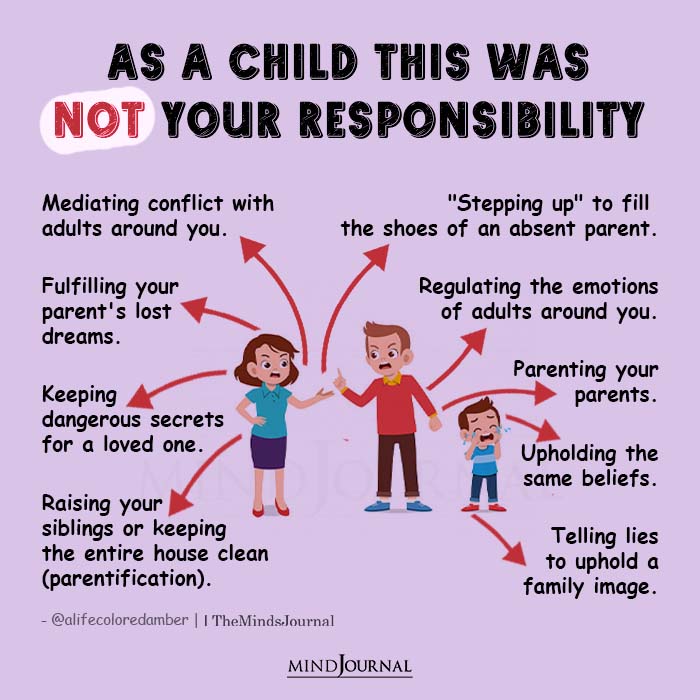
Examples of Emotional Incest
To really understand, let’s delve into some real-life scenarios and examples of emotional incest which answer the question: what is emotional incest?
1. Parental Confidantes
A parent who consistently shares their intimate thoughts, fears, and personal problems with their child, seeking support and guidance that is typically expected from a partner or friend.
A mother shares intimate details about her marital problems with her son, making him feel like he has to ‘step up’ and be the man of the house.
2. Role Reversal
A father, feeling lonely and isolated, starts relying on his daughter for companionship, making her feel guilty for wanting to spend time with friends or pursue her own interests. This is one of the most practical examples of emotional incest.
3. Emotional Substitute
A parent who relies heavily on their child for emotional fulfillment and companionship, treating them as a surrogate partner, rather than allowing them to develop their autonomy and individuality.
4. Over-dependence
A parent constantly leaning on their child for emotional support, making the child feel overwhelmed and unable to focus on their own life.
5. Emotional Manipulation
A parent who uses emotional guilt, coercion, or dependence on their child to meet their own emotional needs, often creating a sense of obligation or responsibility in the child. This is one of the most common examples of emotional incest.
6. Inappropriate Boundaries
A parent who invades their child’s privacy, expecting exclusive emotional access to their thoughts, feelings, and experiences, disregarding the child’s need for personal space and autonomy.
Effects of Emotional Incest
The ripples created by emotional incest can last a lifetime. Emotional incest can have a profound impact on individuals, manifesting in various ways throughout their lives. Some common effects include:
1. Emotional Confusion
Children who experience emotional incest may struggle with understanding healthy emotional boundaries, leading to confusion and difficulty forming healthy relationships in adulthood.
2. Inhibited Independence
Emotional incest can hinder the development of a child’s autonomy and independence, as they become overly dependent on their parent for emotional validation and decision-making.
3. Low Self-Esteem
Growing up in an environment where one’s needs are constantly put second can result in feelings of low self-esteem.
When a child is placed in the role of a surrogate partner, they may develop a distorted sense of self-worth, believing their value lies solely in meeting their parent’s emotional needs.
This is one of the most harmful effects of emotional incest.
4. Relationship Difficulties
Adults who have experienced emotional incest may find it challenging to establish and maintain healthy romantic relationships, often feeling suffocated or overwhelmed by emotional intimacy.
They often struggle to set boundaries in adult romantic relationships. They might feel trapped in codependent relationships or might avoid intimacy altogether for fear of being smothered.
5. Boundary Issues
Individuals who have experienced emotional incest may struggle with setting and maintaining boundaries, often oscillating between being excessively enmeshed or overly distant in their relationships.
6. Emotional Dysregulation
Emotional incest can lead to difficulties in managing emotions, as individuals may have internalized their parent’s unresolved emotional issues.
This can leave them vulnerable to chronic anxiety, depression, feelings of guilt or other psychological distress.
Related: Deprogramming Codependent Beliefs
7. Difficulty in Decision Making
Since they’ve always been told what to feel or think, they might struggle with making decisions on their own.
By now, you might be thinking – what is emotional incest doing to our society? It’s subtly eroding the mental health of many. It’s crucial to recognize the effects of emotional incest, address it, and foster healthier, more balanced relationships.
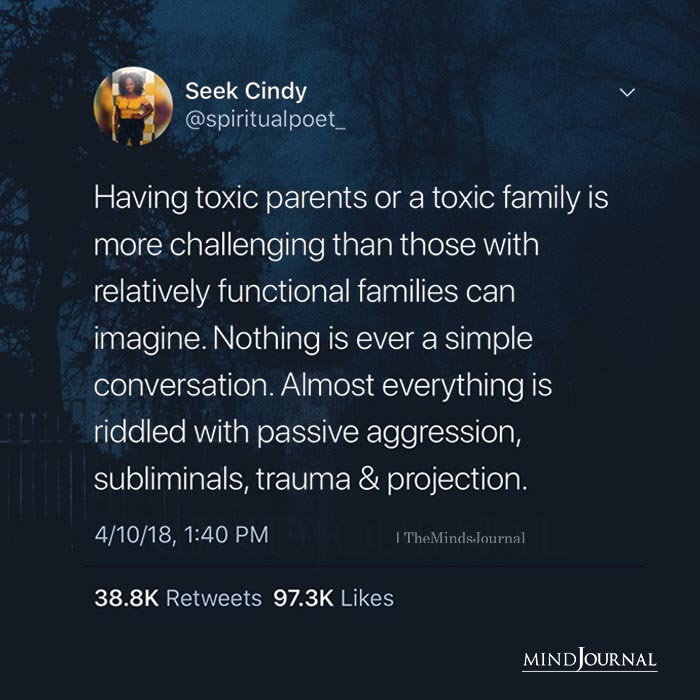
How to Heal from Emotional Incest
Healing from emotional incest is a journey that often requires time, patience, and self-awareness. It’s essential to recognize the signs and then actively work toward establishing healthy boundaries and self-perceptions.
Here are some steps to consider for healing from emotional incest –
1. Acknowledge the Issue
Recognizing and admitting that you’ve experienced emotional incest is the first step. This is not about blaming but about understanding the dynamics that impacted your development.
2. Seek Professional Help
A therapist or counselor who’s familiar with emotional incest or family dynamics can offer insights, coping mechanisms, and healing strategies. This is how to heal from emotional incest.
3. Set Boundaries
Learning to set and enforce healthy boundaries is crucial. This might mean limiting contact with the parent(s) in question or clearly communicating your needs and boundaries to them.
4. Educate Yourself
Understanding the nature of emotional incest can help in your healing journey. Reading books or articles, attending workshops, or joining support groups can be beneficial.
5. Develop a Support System
Surround yourself with supportive friends, family, or support groups who understand your experience. They can provide validation, understanding, guidance and perspective.
6. Prioritize Self-Care
Engaging in activities that promote self-awareness and well-being, such as meditation, journaling, or physical exercise, can be therapeutic. They can help you reconnect with yourself. This is perhaps the best tip on how to heal from emotional incest.
7. Reclaim Your Identity
Spend time discovering who you are outside of the enmeshed relationship. Explore your interests, passions, and desires without the overshadowing influence of the parent.
8. Practice Assertiveness
Since emotional incest can make it hard to voice your own needs and desires, practice being assertive in both small and big matters.
9. Work on Intimacy Issues
Emotional incest can affect your romantic relationships. Be aware of any fears or anxieties around intimacy and work on building healthy relationships built on mutual respect and understanding. This is vital when learning how to heal from emotional incest.
10. Forgive and Release
Healing might also involve forgiving the parent, not for their sake, but for your own peace of mind. This doesn’t mean condoning their actions but rather releasing the heavy burden of resentment.
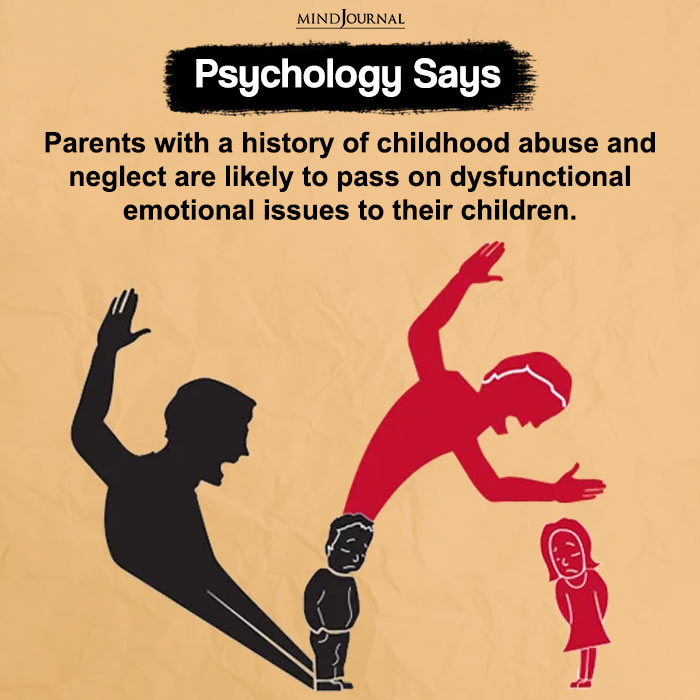
Takeaway
It’s essential to differentiate between a close parent-child bond and emotional incest. A healthy bond nurtures the child’s independence and growth. Emotional incest, on the other hand, stifles it.
If you find yourself asking, “What is emotional incest, and could I be a victim?”, it might be beneficial to consult a therapist or counselor.
Remember, healing from emotional incest is a personal journey, and everyone’s path might look a little different. What’s essential is to prioritize your well-being and mental health, seeking support and resources that resonate with you.
Related: How Emotionally Immature Parents Have a Lasting Effect In A Child’s Adult Life
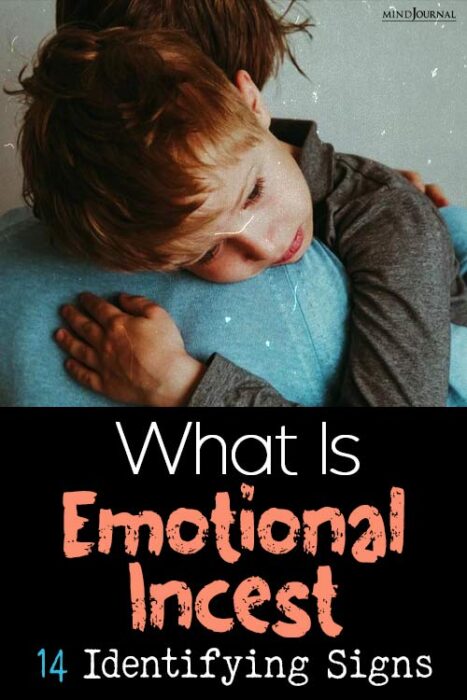
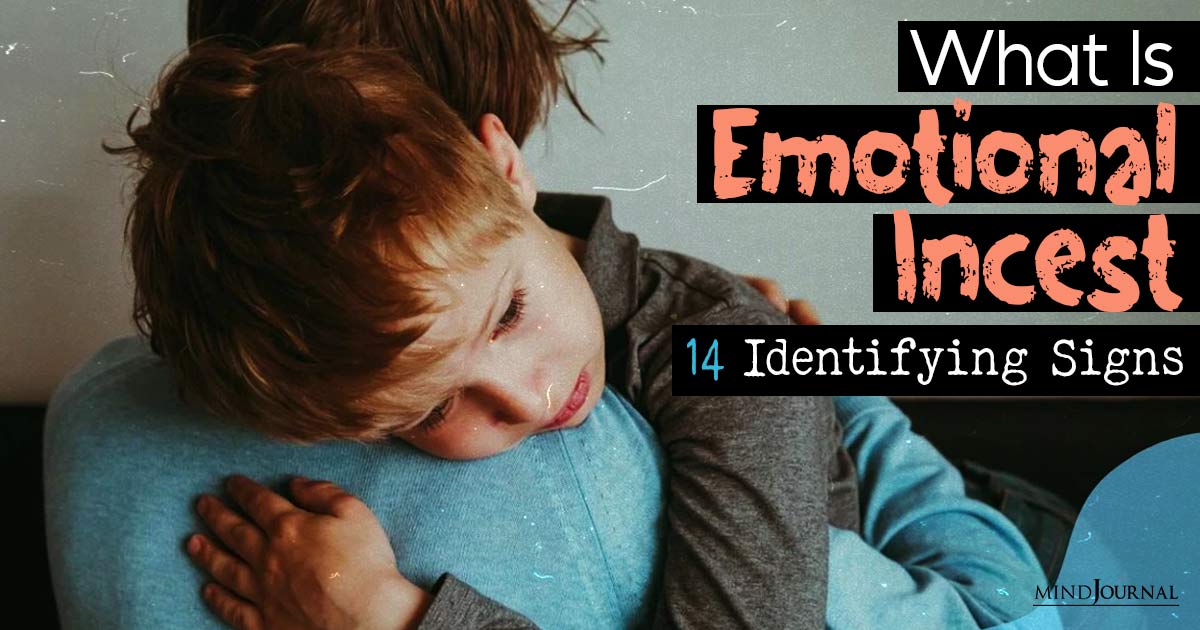






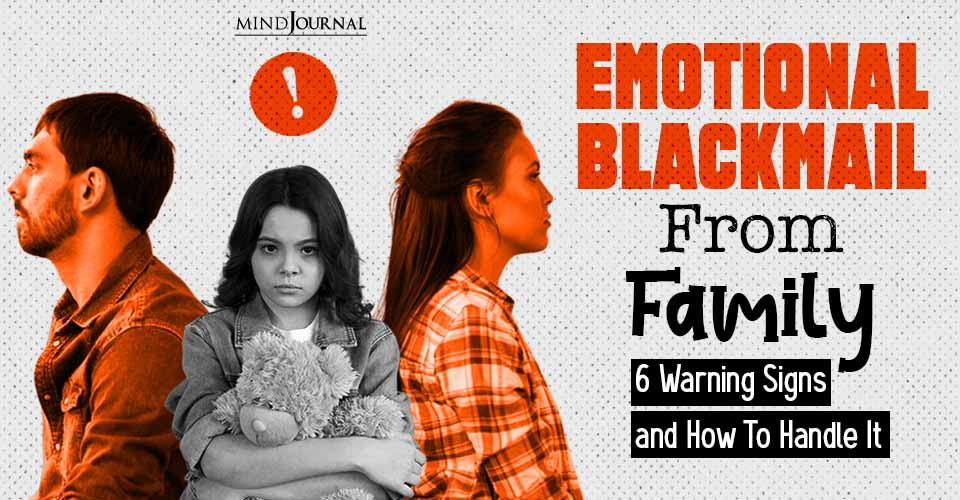
Leave a Reply
You must be logged in to post a comment.